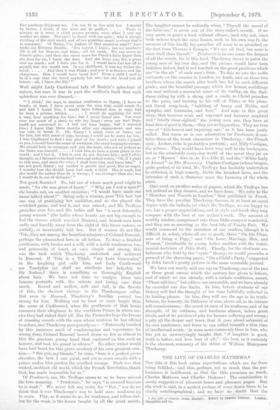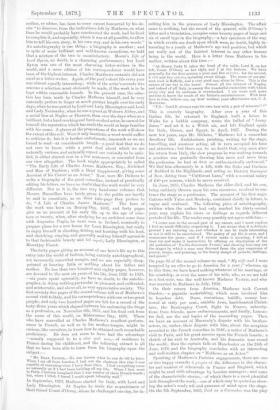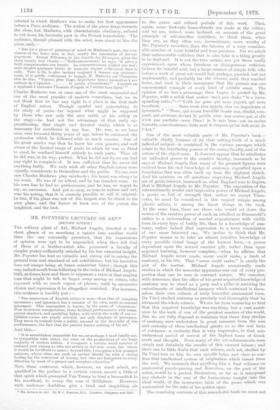THE LIFE OF CHARLES M.ATHEWS.*
THE title of this book raises expectations which are far from being fulfilled,—and this, perhaps, not so much that the per- formance is indifferent, as that the title promises so much. Charles Mathews and Charles Dickens! The combination is surely suggestive of pleasant hours and pleasant pages. But the work is said, in a modest preface of some dozen lines, to be chiefly autobiographical ; and we have no doubt that the * The We of Charles Jaws Milhous. Edited by Charles Dickens. London : Macmillan and Co,
author, or editor, has been to some extent hampered by his de- sire "to discover, from the indications left by Mathews, on what lines he would probably have constructed the work, had he lived to complete it, and especially, where it was at all possible, to allow him to tell his own story, in his own way, and in his own words." An autobiography is one thing ; a biography is another ; and in spite of some brilliant and well-known exceptions, we hold
that a mixture of the two is unsatisfactory. Moore's Life of Lord Byron, no doubt, is a charming performance ; but Lord
Byron was one of the most charming letter-writers in the world, and a more edition of his correspondence would have been of the highest interest. Charles Matthews certainly did not excel as a letter-writer. Again, of the poet's short life every year was almost equally interesting ; while of the actor's seventy-five seasons a selection must obviously be made, if the work is to be kept within reasonable bounds. In the present case, the selec- tion has been made by Charles Mathews himself, and he very naturally prefers to linger at much greater length over his early days, when he was petted by Lord and Lady Blessington and Lord and Lady Normanby, when he was a guest at Woburn Abbey, and a social lion at Naples or Florence, than over the days when as a brilliant, but a hard-working and hard-worked actor, he earned for himself the reputation which has made the world at large familiar with his name. A glance at the proportions of the work will show the extent of this evil. Were it only inartistic, a word would suffice to criticise it ; but it is further unfortunate, inasmuch as we are forced to read—at considerable length—a good deal that we do not care to know, while a great deal about which we are naturally curious, and naturally expect our curiosity to be satis- fied, is either slurred over in a few Hentences, or concealed from our view altogether. The book might appropriately be called "The Early Life of Charles James Mathews, Esq., Architect and Man of Fashion ; with a Brief Supplement, giving some Account of his Career as no Actor." Now, were Mr. Dickens to write a biography of the great comedian, instead of practically editing his letters, we have no doubt that the work would be very different. But as it is, the two very handsome volumes that Messrs. Macmillan have lately given to the public can hardly be said to constitute, as on their title-page they profess to
do, "A Life of Charles James Mathews." The hero of the work was born on Boxing-Day, 1803, and forty pages give us an account of his early. life up to the age of nine-
teen or twenty, when, after studying for an architect some time with Augustus Pugin, he went over to Ireland, nominally to prepare plans for a new house for Lord Blessington, but really to enjoy himself in shooting, fishing, and, hunting with his host, and sketching, singing, and generally making himself agreeable
to that fashionable beauty and bel esprit, Lady Blessington, at Mouutjoy Forest.
The forty pages giving an account of our hero's life up to this entry into the world of fashion, being entirely autobiographical, are necessarily somewhat meagre, and we are especially disap- pointed at hearing little or nothing about his father and mother. No less than two hundred and eighty pages, however, are devoted to the next six years of his life, from 1822 to 1828, —six years spent agreeably, we have no doubt, to the autobio- grapher, in doing nothing particular in pleasant, and cultivated, and aristocratic, and above all, in very appreciative society. The first seventy-five pages of the second volume tell us of Mathews's
second visit to Italy, and his correspondence with one or two great people; and only two hundred pages are left for a record of the forty-three years which elapsed between his embracing the Stage as a profession, on November 6th, 1835, and his final exit from the scene of this world, on Midsummer Day, 1878. Those
who have marvelled at Charles Mathews's excellent perform- ances in French, as well as in his mother-tongue, might be curious, like ourselves, to know how he attained such remarkable Proficiency. He does not seem to have had the advantage
—usually supposed to be a siAo qua non,—of residence in France during his childhood, and the following extract is all
that we have been able to learn from hie biography upon the subject :—
"Mr DEAR FATHER,—No one knows what he can do till he trios. When I set off from London, I had not the slightest idea that I was capable of executing what I have done since. 1 find everything come as naturally as if I had been building all my life. When 1 first went to Paris, I had not imagined that I was master of three French words ; but, when I tried, I found I could speak tolerably well."
In September, 1823, Mathews started for Italy, with Lord and Lady Blessington, At Naples he made the acquaintance of their friend Count d'Orsay, whom he challenged one day, for in-
sulting him in the presence of Lady Blessington. The affair came to nothing, but the record of the quarrel, with D'Orsay's letter and a translation, occupies some twenty pages of large and six of small type in the biography,—a fair specimen of the way in which events are dwelt upon which wore, no doubt, highly in-. teresting to a youth of Mathews's age and position, but which are really not of the faintest interest to any other human being in the world. Here is a letter from Mathews to his mother, written about this time :— " At dinner, Lady B. takes the head of the table, Lord B. on her left, Count D'Orsay on her right, and I at the bottom. We have generally for the first service a joint and five eiltrdes; for the second, a r6ti and five entrdes, including sweet things. The name of our pre- sent cook is Raffelle, and a very good one, when he likes. This is the nature of our day in the house. Almost all the interest of Naples, and indeed of all Italy, is among the wonderful curiosities with which every city and its entirons is overstocked. I am more and more anxious to know the result of my father's entertainment. With best love to him, believe me, my dear mother, your affectionate son, C. J.
MATHEWS.
"P.S.—Lord B. always cuts his own hair with a pair of scissors!! 1" This is scarcely biography. After over a year of this Italian life, he returned to England, built a house in Wales for a bubble company, wrote the ballad of "Jenny Jones" and set it to a Welsh air, and left England again for Italy, Greece, and Egypt, in April, 1827. During the
next few years, says Mr. Dickens, "Mathews led, a somewhat desultor,y life. Architecture, painting, writing for the stage, travelling, and amateur acting, all in turn occupied his time and attention; but there can be no doubt that, very soon after his return from Italy, the Blow progress he was making towards a position was gradually drawing him more and more from the profession he had at first so enthusiastically embraced." We find him alternately in a kilt, with the Duke and Duchess of Bedford in the Highlands, and actiug as District Surveyor
of Bow, dating from "Cutthroat Lane," with a nominal salary of 240 per annum, which he never received.
In June, 1835, Charles Mathews the elder died, and his son, being suddenly thrown upon his own resources, resolved to em- brace the stage as a profession. The account of his first nego- tiations with Yates and Broderip, contained chiefly in letters, is vaghe and confused. The following piece of autobiography, written when the author had only reached his thirty-second year, may explain his views or feelings as regards different periods of his life. The reader may possibly not agree with him:—
"I come now to the second part of my career, and I must confess I feel no small difficulty respecting it. I am aware that it is delicate ground I am entering on, and whether it can be made interesting or not is still to be ascertained. The poetry of my life is over, and I commence the prose ; and if I cannot make it amusing, I will at least try and make it instructive, by offering an illustration of the old quotation of ' Facilis deseensus Averni,' and showing how easy are the stages by which a man may descend from the airy empyrean of poetry, music, and painting, to the heavy slough of pounds, shillings, and pence."
On page 82 of the second volume we read, "Hy wife and I were tempted by an offer to go to America for a year ;" whereas, up to this time, we have heard nothing whatever of his marriage, or his courtship, or even the name of his wife, who, as we are told. in a foot-note, was the well-known Madame Yestris, and who was married to Mathews in July, 1838.
On their return from America, Mathews took Covent Garden,—a gigantic undertaking, which soon involved him in hopeless debt. Duna, executions, bailiffs, money bor- rowed at sixty per cent., amiable Jews, hard-hearted Christ- ians, the Bankruptcy Court, flight to France, subscrip- tions from friends, more embarrassments, and finally, Lancas- ter Jail, are the sad topics of the succeeding pages. Then we have an account of Macree.dy's dispute with his brother- actors, or, rather, their dispute with him, about the reception accorded to the French comedian in 1848; a notice of Mathews's visit to Paris, and his great success upon the French boards ; a sketch of his visit to Australia, and his dramatic tour round the world ; then the curtain falls at Manchester on the 24th of Juno, 1878, and the biography concludes with an interesting and well-written chapter on "Mathews as an Actor."
Speaking of Mathews's Parisian engagements, there are one or two happy remarks apropos of the difference in the charac- ter and number of rehearsals in France and England, which might be read with advantage by London managers ; and some of the characteristic stories,—of which there is a most plentiful lack throughout the work,--one of which may be quoted as show- ing the actor's ready wit and presence of mind upon the stage. On the 7th September, 1863, Oool as a Cucumber was the play
selected in which Mathews was to make his first appearance before a Paris audience. The action of the piece drags towards the close, but Mathews, with characteristic obstinacy, refused to cut down his favourite part in the French translation. The audience, though pleased with the actor, were about to hiss the piece, and,—
" But for a piece of presence of mind on Mathews's part, the con- clusion of the farce was, in fact, nearly the conclusion of the en- gagement. Ernest Filloneau, in the Gazette des Etrangers, gives the
story tersely and clearly Malhourousement,' ho says, piece.a failli compromettre son sauces. Le commencement n'allait pas mal ; mais bientot quelques bruits de mauvais engem s'6lAverent dans la
salle. Vera lo fin, le pert, tardant toujours donner son chnsente- ment, ot le public continuant le tapage, M. Mathews out l'heureuse id6e de dire, " Voyons, pere Gogo, depachons nous; permettez A oes
enfants do s'6pouser le public s'impatiente." Aussit6t on a applaudi t °ammo l'homme d'esprit ot radiate hors ligne.' "
Charles Mathews was at once one of the most successful and one of the most popular of modern comedians, but we do not think that he has any right to a place in the first rank of English actors. Though careful and painstaking in his study of parts—fax beyond what might be supposed by those who saw only the easy rattle of his acting on the stage—he had not the advantage of that early ap- prenticeship, that single and devoted study, which is so necessary for excellence in any line. Ile was, as we have
seen, over two-and-thirty yeirs of age, before he embraced the profession which he followed with so much success. One of
his great merits was that he knew his own powers, and well aware of the limited range of parts in which he was so fitted to excel, he confined himself entirely to such parts. Thus all he did was, in its way, perfect. What he did not do, no one had any right to complain of. It was sufficient that he never did anything badly. We only wish all other English actors were equally considerate to themselves and the public. No one ever saw Charles Mathews play carelessly ; his heart was always in his work. He was of no school, and he has founded none. In his own line he had no predecessors, and he has, we regret to say, no successor. And yet so easy, so true to nature and art, was his acting, that it is scarcely possible to call it original. In fine, if his glass was not of the largest size, he drank in his own glass; and the liquor at least was of the purest, the brightest, and, the best.
































 Previous page
Previous page